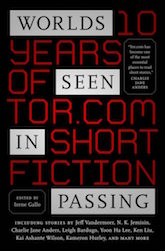On Sunday May 27th Gardner Dozois passed away. On Friday June 1st, essentially through happenstance, I ended up buying several boxes containing hundreds of used copies of Analog and Asimov’s, most of the latter from Dozois’s incredible editorial reign. Unpacking these and perusing their contents accentuated the sense of loss I’d been experiencing since Dozois died, but the experience also hit me in another way. The sheer volume of his editorial contributions was staggering. (And I wasn’t even thinking of his thirty-five years of annual reprint Year’s Best collections, or his many other anthologies, or his consistently interesting short fiction reviews in Locus). How many writers had Dozois discovered and encouraged and promoted over the years? How many voices had he amplified?
In a 2013 interview, Dozois said, “Even after all these years, finding a really first-rate story is still a thrill, one I want to share with others.” I know I’m not alone in feeling a deep sense of gratitude that Dozois did indeed share so many first-rate stories with us through the decades.
I’m not an editor, but as a reader I likewise find it thrilling to discover a new story that speaks to me. And as a writer I also like to shine a spotlight on what I consider strong work, particularly in the field of short fiction. I don’t do this as much as I’d like to, and that thought has been on my mind for some time. I do make a conscious effort to cover short story collections and anthologies in my review column at IGMS, I love taking the opportunity to promote short story writers on the Locus roundtable blog, interview them for the ’zine Words, and so on—but it doesn’t feel like quite enough.
To this end, a few years ago I started a Facebook group dedicated to discussing science fiction/fantasy/horror short stories. Posts have been sporadic and the group hasn’t taken off in the way I know it has the potential to. It’s easy, after all, for us to get sidetracked away from short fiction. Many conversations on social media, even in writers’ circles, tend to focus almost exclusively on novels—when not talking about movies, TV series, comic books, video games, politics, and so on.
Dozois’s passing, and holding all those issues of Asimov’s in my hands five days later, got me thinking about short stories again.
Which brings us to June 5th. Catching up on various reviews feeds and websites, I discovered a series of wonderful short fiction round-up posts by Maria Haskins at the B&N Sci-Fi & Fantasy blog. I was particularly impressed by Haskins’ breadth of coverage, both in terms of markets and aesthetic sensibilities.
Buy the Book


Worlds Seen in Passing: Ten Years of Tor.com Short Fiction
My hunger for short stories recently re-awakened, I noted down, in a casual way, the names of a few writers recommended by Haskins—and promptly added Haskins herself to my working list. Most of these authors were “new” in a double sense: they hadn’t been publishing for a long time, and I personally hadn’t encountered their work before.
Initially, you have to understand, I was simply writing them down so I wouldn’t forget them. But looking up their names led to several more names, which in turn led to bibliographies with markets I was woefully behind on, which in turn led to finding more new writers, and so on.
The list grew and grew.
As it did, I realized it might be fun to share it with others. After all, it can be challenging for writers in the fantastic genres who work primarily at short lengths to get the attention they deserve. As my compilation of names expanded, I also found myself codifying certain principles for inclusion/exclusion on the list, to keep things somewhat sane.
In short:
- My primary reference tool to look up writers quickly became ISFDB. I know it has limitations, but that’s what I used.
- I decided to place an arbitrary cut-off at 2012. Intuitively, a writer who had been at it for more than six years didn’t really feel “new” to me. As I said, I know this is arbitrary. I could have just as easily chosen 2015 or 2010. And I’m sure I could look for psychological reasons to explain why I placed the cut-off at 2012, but ultimately it doesn’t matter; that’s what I went with. Any writer with an ISFDB credit prior to 2012 was ineligible.
- To be included on the list, a writer had to have a writing credit in 2018. I wanted to find “new” writers still actively publishing.
- I looked at a variety of markets, but I didn’t try to be comprehensive, I didn’t follow formal criteria for what markets to include or exclude, and I was often guided by whimsy. Wheee!
- I do tend to read short fiction regularly, and so I left many writers off because they simply weren’t new to me. But even here I wasn’t always consistent.
- I started to get tired around 130 names in and decided to stop at 150. Again, no specific reason. I could have brought the list to an end at 50 or 100 or pushed on until 200 or beyond. But I did notice the cumulative total of stories at 150 names was approaching 1,000, which seemed like more than enough…
Here’s the list, arranged in chronological order by year of the first story credit according to ISFDB, and alphabetically by first name within each year:
Please keep in mind, this list is in no way meant to be all-encompassing or intensely rigorous or canon-suggesting or awards-consideration-related or anything like that. It’s a personal, provisional snapshot, subject to the constraints I mentioned above. I made it for fun!
That said, I’d be pleased if it inspired the reading of short stories and got folks talking about writers who may otherwise pass under the radar. “Fighting the good fight,” as the B&N Sci-Fi & Fantasy blog tweeted at me. In that sense, this list is in the spirit of Dozois’s editorial work, a tiny tribute to his vast enterprise.
Most of all, I’m hoping you’ll look at it and say things like, “What?! This writer is obviously missing!” or “Yes, we all know about that writer, did they really need to be on yet another list?” and so forth. Add your own names, using whatever criteria you decide—and if you’d be so kind, do so in the comments, so we can all benefit.
 Alvaro Zinos-Amaro is the author of the Hugo- and Locus-finalist Traveler of Worlds: Conversations With Robert Silverberg (2016). Alvaro has published many stories, essays, reviews, and interviews, as well as Rhysling-nominated poetry.
Alvaro Zinos-Amaro is the author of the Hugo- and Locus-finalist Traveler of Worlds: Conversations With Robert Silverberg (2016). Alvaro has published many stories, essays, reviews, and interviews, as well as Rhysling-nominated poetry.










